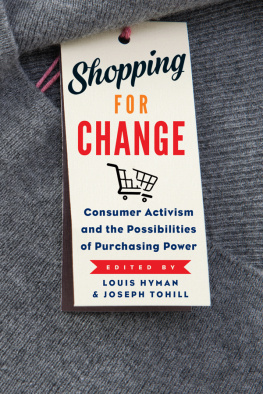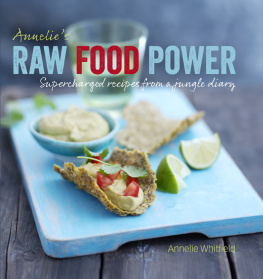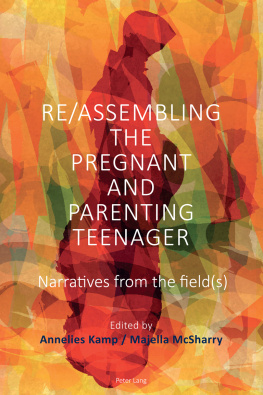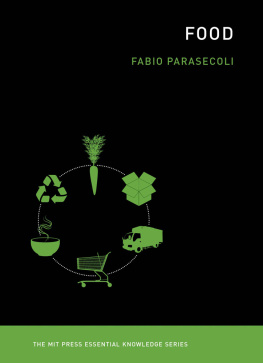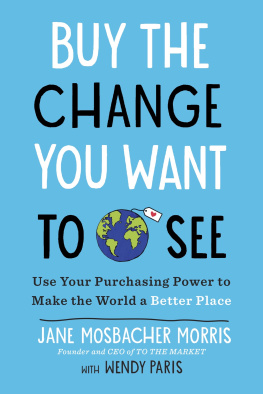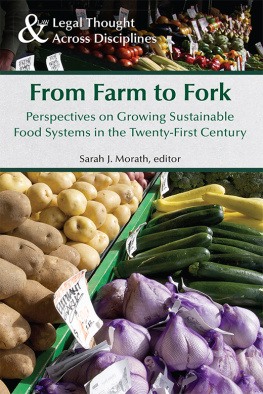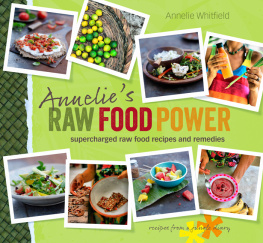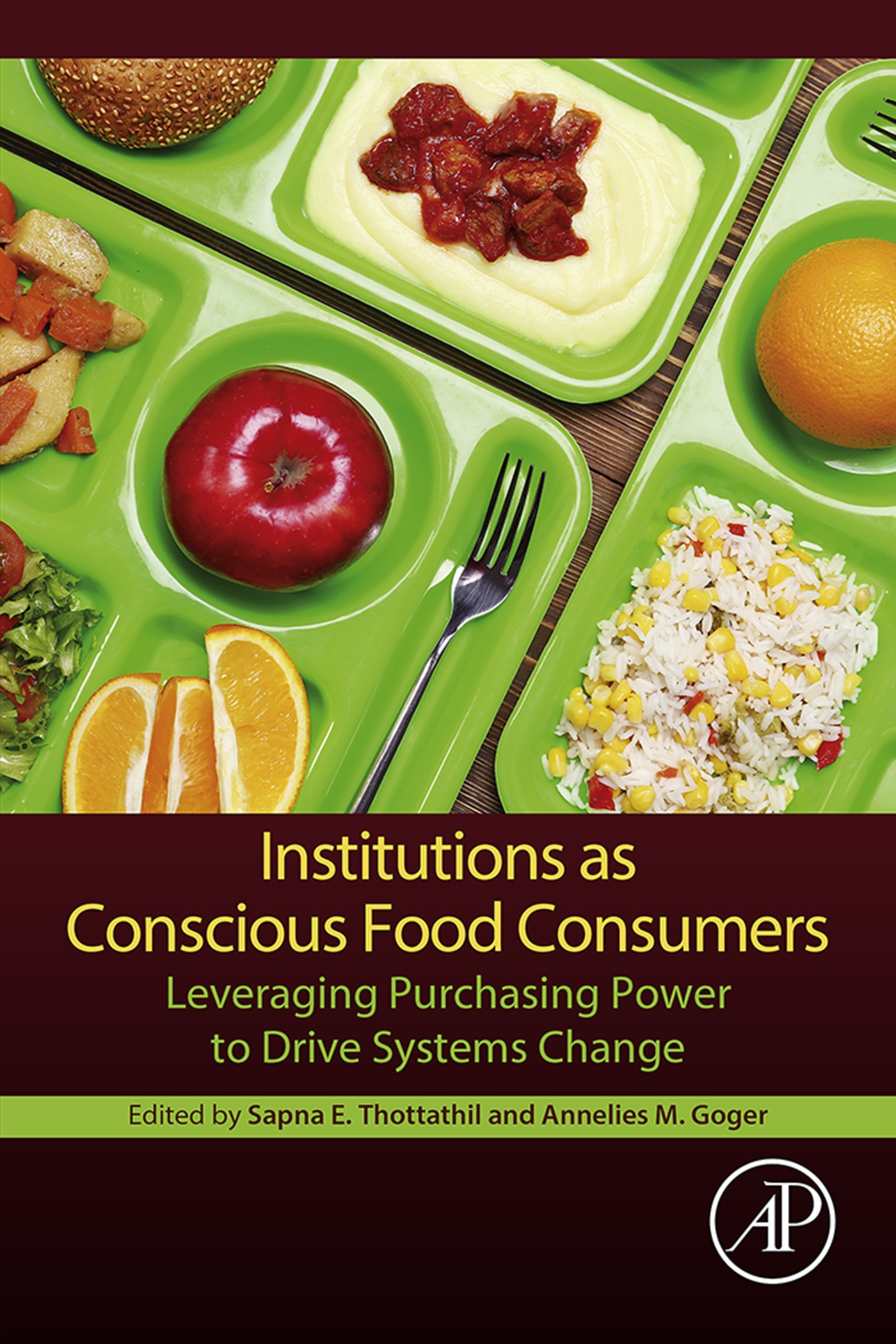Institutions as Conscious Food Consumers
Leveraging Purchasing Power to Drive Systems Change
First Edition
Sapna E. Thottathil
Annelies M. Goger

Copyright
Academic Press is an imprint of Elsevier
125 London Wall, London EC2Y 5AS, United Kingdom
525 B Street, Suite 1650, San Diego, CA 92101, United States
50 Hampshire Street, 5th Floor, Cambridge, MA 02139, United States
The Boulevard, Langford Lane, Kidlington, Oxford OX5 1GB, United Kingdom
2019 Elsevier Inc. All rights reserved.
No part of this publication may be reproduced or transmitted in any form or by any means, electronic or mechanical, including photocopying, recording, or any information storage and retrieval system, without permission in writing from the publisher. Details on how to seek permission, further information about the Publishers permissions policies and our arrangements with organizations such as the Copyright Clearance Center and the Copyright Licensing Agency, can be found at our website: www.elsevier.com/permissions.
This book and the individual contributions contained in it are protected under copyright by the Publisher (other than as may be noted herein).
Notices
Knowledge and best practice in this field are constantly changing. As new research and experience broaden our understanding, changes in research methods, professional practices, or medical treatment may become necessary.
Practitioners and researchers must always rely on their own experience and knowledge in evaluating and using any information, methods, compounds, or experiments described herein. In using such information or methods they should be mindful of their own safety and the safety of others, including parties for whom they have a professional responsibility.
To the fullest extent of the law, neither the Publisher nor the authors, contributors, or editors, assume any liability for any injury and/or damage to persons or property as a matter of products liability, negligence or otherwise, or from any use or operation of any methods, products, instructions, or ideas contained in the material herein.
Library of Congress Cataloging-in-Publication Data
A catalog record for this book is available from the Library of Congress
British Library Cataloguing-in-Publication Data
A catalogue record for this book is available from the British Library
ISBN 978-0-12-813617-1
For information on all Academic Press publications visit our website at https://www.elsevier.com/books-and-journals

Publisher: Andre Gerhard Wolff
Acquisition Editor: Nancy Maragioglio
Editorial Project Manager: Barbara Makinster
Production Project Manager: Omer Mukthar
Cover Designer: Matthew Limbert
Typeset by SPi Global, India
Contributors
Numbers in Parentheses indicate the pages on which the authors contributions begin.
Peter H. Allison (175), Farm to Institution New England, Hartland, VT, United States
Catherine Bartoli (127), Get Healthy Philly, Philadelphia Department of Public Health, Philadelphia, PA, United States
Thomas M. Bass (195), Animal & Range Sciences Extension Service, Montana State University Extension, Bozeman, MT, United States
Deborah Bentzel (285), The Food Trust, Philadelphia, PA, United States
Megan Bucknum (285), Rowan University, Glassboro, NJ, United States
Carmen Byker Shanks (195), Food and Health Lab, Department of Health and Human Development, Montana State University, Bozeman, MT, United States
Christine C. Caruso (261), University of Saint Joseph, West Hartford, CT, United States
Gina Castillo (21), Oxfam America, Boston, MA, United States
Kathryn Colasanti (149), Center for Regional Food Systems, Michigan State University, East Lansing, MI, United States
Lindsey Day Farnsworth (103), Center for Integrated Agricultural Systems, University of Wisconsin-Madison, Madison, WI, United States
Alexa Delwiche (103), Center for Good Food Purchasing, Berkeley, CA, United States
Jonathan Deutsch (127), Center for Food and Hospitality Management; Department of Nutrition Sciences, Drexel University, Philadelphia, PA, United States
Claire M. Fitch (77), Farm Forward, Portland, OR, United States
Benjamin Fulton (127), Center for Food and Hospitality Management, Drexel University, Philadelphia, PA, United States
Annelies M. Goger (47), Social Policy Research Associates, Oakland, CA, United States
Kristal Jones (21), National Socio-Environmental Synthesis Center, University of Maryland, Annapolis, MD, United States
Kendra Klein (239), Friends of the Earth, Berkeley, CA, United States
Hannah R. Leighton (175), Farm to Institution New England, Hartland, VT, United States
Elise Littler (307), Farm Animal Protection, The Humane Society of the United States, Washington, DC, United States
Colleen Matts (149), Center for Regional Food Systems, Michigan State University, East Lansing, MI, United States
Colleen McKinney (103), Center for Good Food Purchasing, Berkeley, CA, United States
Kristie Middleton (307), Farm Animal Protection, The Humane Society of the United States, Washington, DC, United States
Brandy-Joe Milliron (127), Department of Nutrition Sciences, Drexel University, Philadelphia, PA, United States
Kranti Mulik (219), Fairfax, Virginia, United States
Jenna Newbrey (239), Health Care Without Harm, Reston, VA, United States
Kimberly Pfeifer (21), Oxfam America, Boston, MA, United States
Nessa J. Richman (175), Rhode Island Food Policy Council, Kingston, Rhode Island, United States
Amy Rosenthal (261), Rutgers University, New Brunswick, NJ, United States
Raychel E. Santo (77), Johns Hopkins Center for a Livable Future, Department of Environmental Health and Engineering, Bloomberg School of Public Health, Baltimore, MD, United States
Joel B. Schumacher (195), Department of Agricultural Economics & Economics, Montana State University Extension, Bozeman, MT, United States
Emma Sirois (239), Health Care Without Harm, Reston, VA, United States
Sapna E. Thottathil (3), University of California, Office of the President, Oakland, CA, United States
Kaitlin K. Wojciak (149), Michigan State University Extension, East Lansing, MI, United States
Alexandra Zeitz (127), Center for Food and Hospitality Management, Drexel University, Philadelphia, PA, United States
Foreword
Anim Steel
My first experience of politics was in middle school. My parents, a black Ghanaian woman and a white American man who had relocated the family from West Africa to Washington D.C., took my sister and me to a protest in front of the South African embassy. Circling the sidewalk that cold night, with the candles melting onto our fingers, we became part of a worldwide movement to support the freedom struggle in South Africa. Later that year, the University of California Board of Regents was compelled by student protests to withdraw billions of dollars of assets from South Africa, joining over a hundred other universities and municipalities in the divestment campaign.
This was the 1980s. Apartheid then seemed as intractable as the Cold War and as durable as Ronald Reagan, whose administration was no friend to the anti-apartheid movement. And so, just five years later, my family was riveted by the television images of Nelson Mandela waving to the crowds from the balcony of Cape Town City Hall after nearly three decades in prison.




